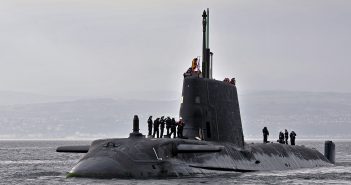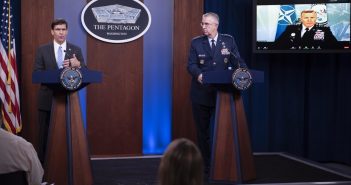
US-UK-Australia Deal is as Much About Speed as Subs
The most important element of the agreement, however, isn’t about subs, but how quickly three allies can move to address capability shortfalls.

The most important element of the agreement, however, isn’t about subs, but how quickly three allies can move to address capability shortfalls.

For many around the world, however, the events of the last week have reinforced the perception that the United States is simply not ready for prime time, whether in launching — and dragging allies into — costly, destabilizing and ultimately pointless wars, embracing questionable financial practices that plunged the world into an economic crisis, or proving unable fight a devastating pandemic that’s killed more 620,000 Americans. The world, rightly, expects the United States to do big things well, whether in crafting strategy, meaningful capabilities, starting wars or ending them.

A nation where leaders and a large chunk of the population either can’t tell fact from fiction — or deliberately won’t — can be exploited, whether internally by opportunists or externally by adversaries. This was the weakness Russia manipulated to tip the 2016 election in Trump’s favor with a disinformation campaign that cost about $100 million, the price of a single F-35 stealth fighter.

America has two years to field the capabilities needed to continue deterring an every more emboldened and capable China. Biden’s defense team will have to move fast make long-overdue changes to field new capabilities and operational concepts to maintain the nation’s deterrent edge.

Navy Secretary Ken Braithwaite was on the mark by naming the latest Virginia-class submarine for Barb in memory of Gene Fluckey’s legendary World War II boat. It’s time the Navy continues this tradition and brings back other historic names to the submarine force. Those who served aboard nuclear submarines named for their illustrious World War II predecessors all note the pride what that heritage represented. Each of those boats carried aboard them the flags their namesakes flew in battle, tangible touchstones that instilled pride and esprit de corps in their crews.

The Trump administration’s plan to cut 12,000 US troops from Germany will hurt NATO, undermine America’s global reputation, help Russia by reducing US troops in Germany by a third and stoking discord among key alliance members, and waste time and money.

Whoever wins the presidency in November must take a cue from President Eisenhower to craft a similar long-term approach toward China — as well as Russia — and shape a force needed to deter, and if necessary, defeat both, but on a budget.

The fire aboard the US Navy amphibious assault ship Bonhomme Richard in San Diego raises profound questions about the competence and capacity of the service and its leadership — with budget, strategy and deterrence implications.

The Cyberspace Solarium Commission’s recommendations must be implemented now because its time for America to step up its cyber game at a time when more people are more vulnerable than ever. Failing to act to study job descriptions is simply inexcusable when you’re in the midst of a crisis than demands putting someone in charge of the battle and getting rounds on target.

The recent deadly skirmish between China and India in a disputed border area has fueled a necessary debate over how best to respond to an increasingly belligerent Beijing. As the only pressure that moves Beijing is when the world unites against it, it’s imperative the international community quickly organize to compel Chinese leaders to change course before they do something we all will regret.
